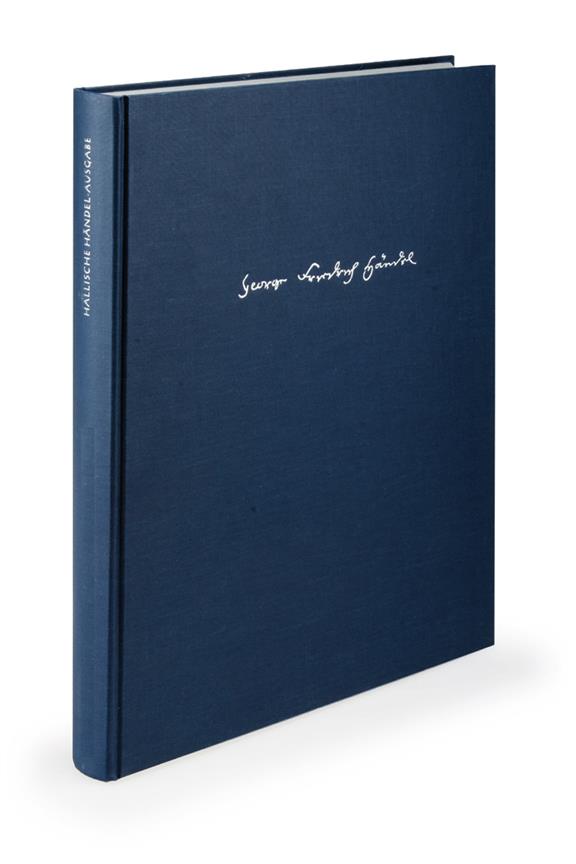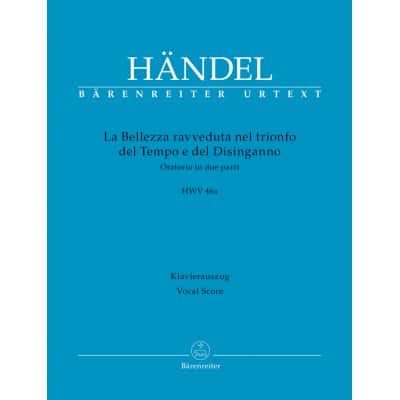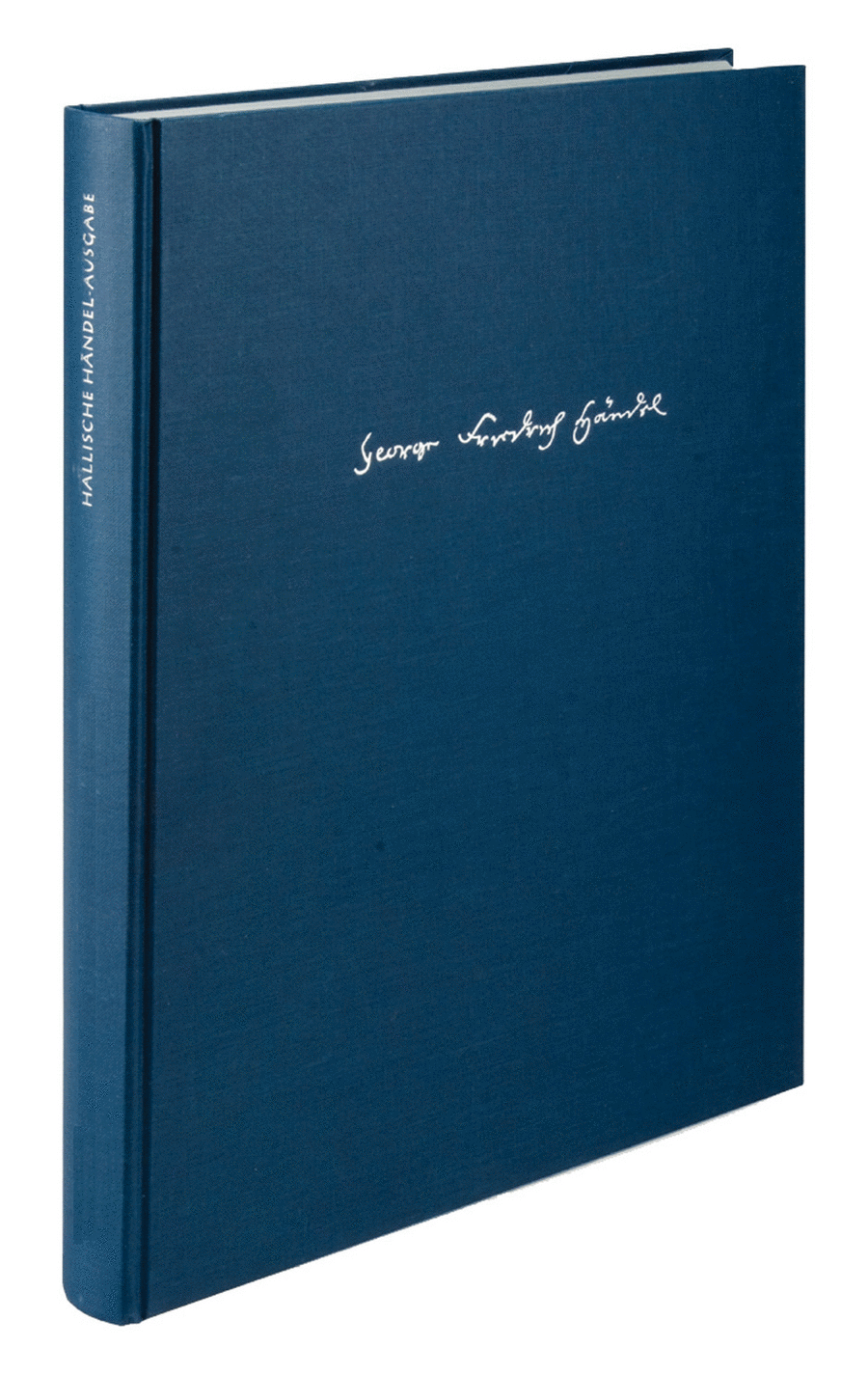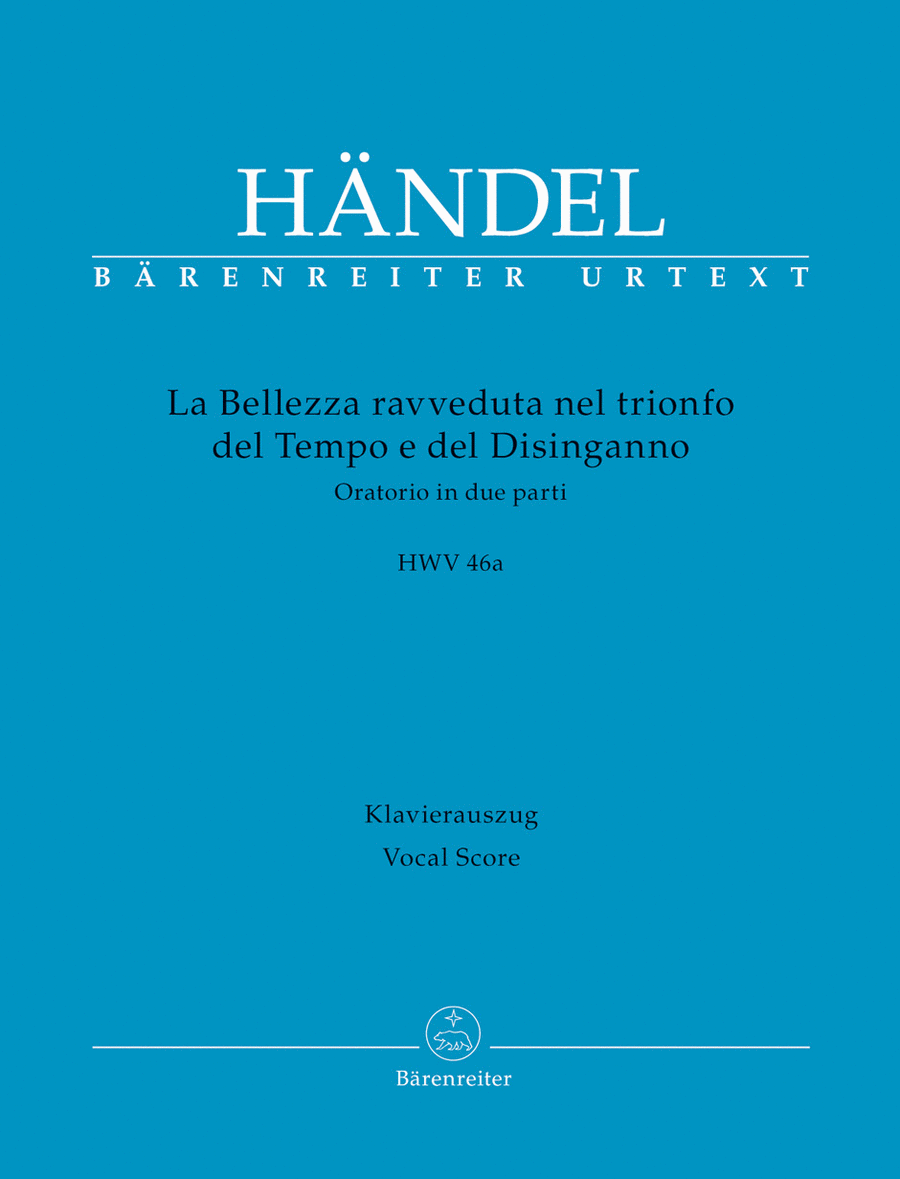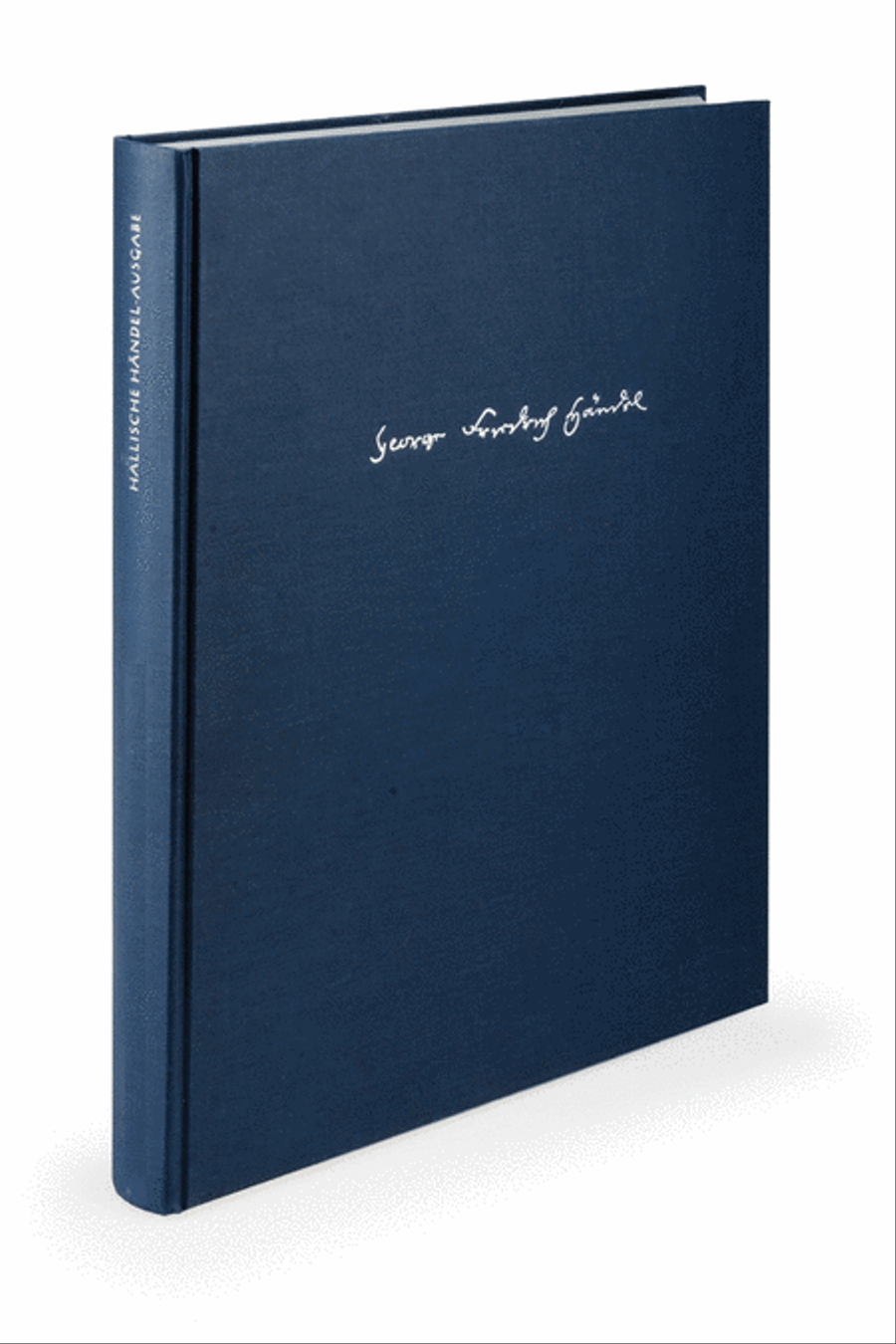|
| HANDEL G.F. - LA BELLEZZA
RAVVEDUTA NEL TRIONFO DEL
TEMPO E DEL DISINGANNO
HWV 46a - VOCAL SCORE
Choeur et ensemble vocal
BARENREITER
Händel, Georg Friedrich
La Bellezza ravveduta nel trionfo del Tempo e del ...(+)
Händel, Georg Friedrich
La Bellezza ravveduta nel trionfo del Tempo e del Disinganno HWV 46a
Oratorio in two Parts
Rome 1707
- Urtext edition based on the “Halle Handel Edition” (HHA)
- With literal German and English translations
- Comprehensive Foreword (Ger/Eng)
- Idiomatic uncluttered piano reduction
Handel composed his first Italian oratorio “La Bellezza ravveduta nel trionfo del Tempo e del Disinganno” in 1707. It is based on an allegorical moral libretto written by Cardinal Benedetto Pamphili who also commissioned this work.
Disinganno (Illumination) and Tempo (Time) try to get the young, beautiful and frivolous Bellezza (Beauty) to recognise the true values of life and to act accordingly. The audience accompanies Bellezza in her spiritual development, in which she increasingly distances herself from Piacere (Pleasure) and listens more and more to Tempo and Disinganno.
The oratorio contains some of the most beautiful music Handel ever composed. This includes the enchanting aria “Lascia la spina”, in which he uses the music of the sarabande from the opera “Almira”, composed in Hamburg in 1704, and which then achieved immortal fame in “Rinaldo” (1711) as “Lascia ch’io pianga”. / Partitions classique / Vocale - chorale / Choeur et ensemble vocal / BARENREITER
Délais: Sur commande | | |
| La Bellezza ravveduta nel
trionfo del Tempo e del
Disinganno HWV 46a
(HAENDEL GEORG FRIEDRICH)
Opéra [Partition]
Barenreiter
Oratorio in two parts Rome 1707. Par HAENDEL GEORG FRIEDRICH. With his “La Bel...(+)
Oratorio in two parts Rome 1707. Par HAENDEL GEORG FRIEDRICH. With his “La Bellezza ravveduta nel trionfo del Tempo e del Disinganno” (“Beauty Reformed in the Triumph of Time and Enlightenment”), HWV 46a, the 22-year-old Handel notched up one of his greatest successes in this genre right at the very beginning of his oratorio oeuvre. Composed in Rome in 1707, the work was for a long time known as “Il trionfo del Tempo e del Disinganno” (“The Triumph of Time and Enlightenment”). In keeping with the Halle Handel Edition, however, the title is that of the name given in the primary source.
In many cases inspired by the melodically rich ideas of Reinhard Keiser (1674–1739), the work is unsurpassed by any other oratorio by Handel. At the end of an impressive sequence of truly captivating arias, duets and quartets, Bellezza’s reformation in favour of living a life pleasing to God is accompanied in incisive E major by her overwhelmingly beautiful, impossibly sad closing aria “Tu del ciel ministro eletto”, the consummate pinnacle of dramatic irony in Handel’s output.
By virtue of its flawless dramatic structure as well – unlike many other oratorios and all operas of the Baroque period, the story never goes off at a tangent and all arias revolve around the dispute of the four dramatic personae – the oratorio has enjoyed long runs of widely acclaimed, mostly staged performances in the last few years./ Répertoire / Opéra
Délais: 2-5 jours - En Stock Fournisseur | |
|
|
|
| Il trionfo del Tempo e della Verità, HWV 46 b
Soli, choeur mixte et accompagnement
Soli, chœur mixte et orchestre
Barenreiter
Soloists, Mixed choir, Orchestra SKU: BA.BA10726-01 Oratorio in three ...(+)
Soloists, Mixed choir,
Orchestra SKU:
BA.BA10726-01
Oratorio in three
parts. Composed by
George Frideric Handel.
Edited by Michael
Pacholke. This edition:
Complete edition. Linen.
Complete edition, Score.
HWV 46. Baerenreiter
Verlag #BA10726-01.
Published by Baerenreiter
Verlag (BA.BA10726-01).
ISBN 9790006575596. 33
x 26 cm inches. Text
Language: Italian.
Preface: Pacholke,
Michael. In the
brief half-year period
from August 14, 1736, to
January 27, 1737, Georg
Friedrich Handel achieved
an unprecedented level of
productivity in his opera
compositions, creating
three operas.
Additionally, in March
1737, he also composed a
largely new oratorio
titled â??Il trionfo del
Tempo e della
Verità â? (â??The
Triumph of Time and
Truthâ?) HWV 46b. The
libretto of this oratorio
closely corresponds to
that of the oratorio
â??La Bellezza ravveduta
nel trionfo del Tempo e
del Disingannoâ?
(â??Beauty Reconciled in
the Triumph of Time and
Enlightenmentâ?) HWV
46a written in 1707. With
â??La Bellezza
ravvedutaâ?, Handel
composed an allegorical
and particularly dramatic
oratorio right at the
beginning of his oratorio
compositions. In this
work, there is no chorus
inclined towards
reflection. Not only do
the four allegorical
figures, Bellezza
(Beauty), Piacere
(Pleasure), Tempo (Time),
and Disinganno
(Enlightenment), listen
to each other and react
to the ideas presented by
the others, but this
prevailing dramatic
principle of dispute is
also found in the
recitatives.
In
1737, when reworking the
oratorio material as
â??Il trionfo del Tempo
e della Verità â?,
Handel approached the
task pragmatically. He
needed a new non-dramatic
work to fulfill the
eveningâ??s program for
his audience at the
Covent Garden Theatre
during the fasting season
when theatrical
performances were
prohibited. Although he
had excellent Italian
vocal soloists, notorious
for their pronunciation
in Handelâ??s English
oratorios and who
naturally preferred
singing in Italian,
Handel found a solution.
It was evident to Handel
that, in response to the
ban on performances of
his Italian operas during
the fasting season of
1737, he should promptly
create a new oratorio in
the Italian language but
following the three-part
â??Englishâ? oratorio
form that he had
developed in
â??Estherâ? HWV 50b
in 1732. Unlike in Rome
in 1707, he had access to
a chorus in London in
1737, and the English
oratorio, with its
substantial choral
sections, a preference
for concert-like rather
than dramatic
composition, and frequent
inclusion of organ
concertos loosely related
to the narrative, was
already
established.
The
new volume of the HHA
includes the original
version of the 1737
premiere as well as all
the surviving early and
later versions (the
latter being exceptional
highlights) of individual
musical pieces from
â??Il trionfo del Tempo
e della
Verità â?.
$527.95 - Voir plus => AcheterDélais: 1 to 2 weeks | | | |
| La Bellezza ravveduta nel trionfo del Tempo e del Disinganno, HWV 46a
Soli, choeur mixte et accompagnement
Soli, chœur mixte et orchestre
Barenreiter
Soloists, Orchestra (2Sg-S-solo,Sg-A-solo,Sg- T-solo,Orch) SKU: BA.BA10721-90...(+)
Soloists, Orchestra
(2Sg-S-solo,Sg-A-solo,Sg-
T-solo,Orch) SKU:
BA.BA10721-90
Oratorio in two
Parts. Composed by
George Frideric Handel.
Edited by Michael
Pacholke. Arranged by
Christopher Sokolowski.
This edition: urtext
edition. Paperback.
Barenreiter Urtext. Rome
1707. Vocal Score. HWV
46A. Baerenreiter Verlag
#BA10721_90. Published by
Baerenreiter Verlag
(BA.BA10721-90). ISBN
9790006568680. 27 x 19 cm
inches. Text Language:
Italian. Preface: Annette
Landgraf. Text: Pamphili,
Benedetto. Handel
composed his first
Italian oratorioLa
Bellezza ravveduta nel
trionfo del Tempo e del
DisingannoHWV 46a in
1707. It is based on an
allegorical moral
libretto written by
Cardinal Benedetto
Pamphili who also
commissioned this
work.
Disinganno
(Illumination) and Tempo
(Time) try to get the
young, beautiful and
frivolous Bellezza
(Beauty) to recognise the
true values of life and
to act accordingly. The
audience accompanies
Bellezza in her spiritual
development, in which she
increasingly distances
herself from Piacere
(Pleasure) and listens
more and more to Tempo
and
Disinganno.
The
oratorio contains some of
the most beautiful music
Handel ever composed.
This includes the
enchanting ariaLascia la
spina, in which he uses
the music of the
sarabande from the
operaAlmira, composed in
Hamburg in 1704, and
which then achieved
immortal fame
inRinaldo(1711) asLascia
ch'io pianga.
$44.95 - Voir plus => AcheterDélais: 1 to 2 weeks | | | |
| La Bellezza ravveduta nel trionfo del Tempo e del Disinganno, HWV 46a (Rome 1707)
Opéra
Barenreiter
Oratorio in two parts. Composed by George Frideric Handel (1685-1759). Edited ...(+)
Oratorio in two parts.
Composed by George
Frideric
Handel (1685-1759).
Edited by
Michael Pacholke. This
edition: complete
edition,
urtext edition. Cloth
bound.
Hallische Handel-Ausgabe
(HHA) I/4,1. Rome 1707.
Complete Edition, Score.
HWV
46a. Baerenreiter Verlag
#BA10721-01. Published by
Baerenreiter Verlag
$407.95 - Voir plus => AcheterDélais: 1 to 2 weeks | | |
|
|
